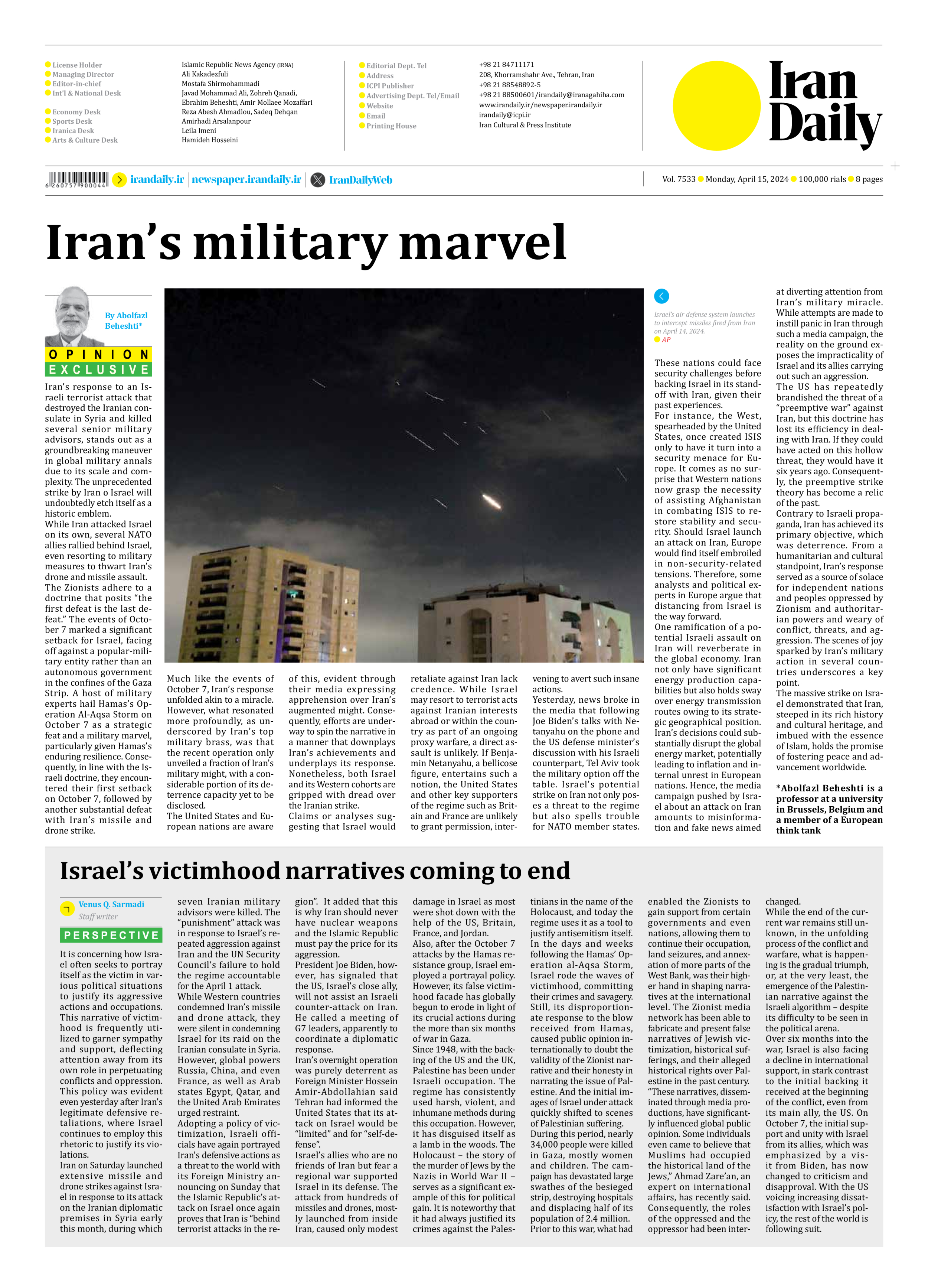
Iran’s military marvel
By Abolfazl Beheshti
Iran’s response to an Israeli terrorist attack that destroyed the Iranian consulate in Syria and killed several senior military advisors, stands out as a groundbreaking maneuver in global military annals due to its scale and complexity. The unprecedented strike by Iran o Israel will undoubtedly etch itself as a historic emblem.
While Iran attacked Israel on its own, several NATO allies rallied behind Israel, even resorting to military measures to thwart Iran’s drone and missile assault.
The Zionists adhere to a doctrine that posits “the first defeat is the last defeat.” The events of October 7 marked a significant setback for Israel, facing off against a popular-military entity rather than an autonomous government in the confines of the Gaza Strip. A host of military experts hail Hamas’s Operation Al-Aqsa Storm on October 7 as a strategic feat and a military marvel, particularly given Hamas’s enduring resilience. Consequently, in line with the Israeli doctrine, they encountered their first setback on October 7, followed by another substantial defeat with Iran’s missile and drone strike.
Much like the events of October 7, Iran’s response unfolded akin to a miracle. However, what resonated more profoundly, as underscored by Iran’s top military brass, was that the recent operation only unveiled a fraction of Iran’s military might, with a considerable portion of its deterrence capacity yet to be disclosed.
The United States and European nations are aware of this, evident through their media expressing apprehension over Iran’s augmented might. Consequently, efforts are underway to spin the narrative in a manner that downplays Iran’s achievements and underplays its response. Nonetheless, both Israel and its Western cohorts are gripped with dread over the Iranian strike.
Claims or analyses suggesting that Israel would retaliate against Iran lack credence. While Israel may resort to terrorist acts against Iranian interests abroad or within the country as part of an ongoing proxy warfare, a direct assault is unlikely. If Benjamin Netanyahu, a bellicose figure, entertains such a notion, the United States and other key supporters of the regime such as Britain and France are unlikely to grant permission, intervening to avert such insane actions.
Yesterday, news broke in the media that following Joe Biden’s talks with Netanyahu on the phone and the US defense minister’s discussion with his Israeli counterpart, Tel Aviv took the military option off the table. Israel’s potential strike on Iran not only poses a threat to the regime but also spells trouble for NATO member states. These nations could face security challenges before backing Israel in its standoff with Iran, given their past experiences.
For instance, the West, spearheaded by the United States, once created ISIS only to have it turn into a security menace for Europe. It comes as no surprise that Western nations now grasp the necessity of assisting Afghanistan in combating ISIS to restore stability and security. Should Israel launch an attack on Iran, Europe would find itself embroiled in non-security-related tensions. Therefore, some analysts and political experts in Europe argue that distancing from Israel is the way forward.
One ramification of a potential Israeli assault on Iran will reverberate in the global economy. Iran not only have significant energy production capabilities but also holds sway over energy transmission routes owing to its strategic geographical position. Iran’s decisions could substantially disrupt the global energy market, potentially leading to inflation and internal unrest in European nations. Hence, the media campaign pushed by Israel about an attack on Iran amounts to misinformation and fake news aimed at diverting attention from Iran’s military miracle. While attempts are made to instill panic in Iran through such a media campaign, the reality on the ground exposes the impracticality of Israel and its allies carrying out such an aggression.
The US has repeatedly brandished the threat of a “preemptive war” against Iran, but this doctrine has lost its efficiency in dealing with Iran. If they could have acted on this hollow threat, they would have it six years ago. Consequently, the preemptive strike theory has become a relic of the past.
Contrary to Israeli propaganda, Iran has achieved its primary objective, which was deterrence. From a humanitarian and cultural standpoint, Iran’s response served as a source of solace for independent nations and peoples oppressed by Zionism and authoritarian powers and weary of conflict, threats, and aggression. The scenes of joy sparked by Iran’s military action in several countries underscores a key
point.
The massive strike on Israel demonstrated that Iran, steeped in its rich history and cultural heritage, and imbued with the essence of Islam, holds the promise of fostering peace and advancement worldwide.
*Abolfazl Beheshti is a professor at a university in Brussels, Belgium and a member of a European think tank







